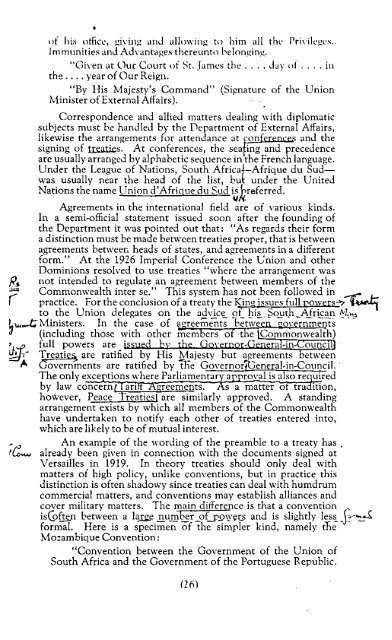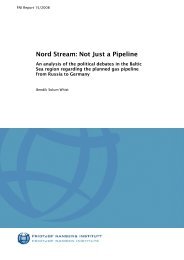SAIIA SOUTH AFRICAN DIPLOMATS ABROAD.pdf
SAIIA SOUTH AFRICAN DIPLOMATS ABROAD.pdf
SAIIA SOUTH AFRICAN DIPLOMATS ABROAD.pdf
You also want an ePaper? Increase the reach of your titles
YUMPU automatically turns print PDFs into web optimized ePapers that Google loves.
of his office, giving and allowing to him all the Privileges..<br />
Immunities and Advantages thereunto belonging.<br />
"Given at Our Court of St. James the .... day ol . . . . in<br />
the .... year of Our Reign.<br />
"By His Majesty's Command" (Signature of the Union<br />
Minister of External Affairs).<br />
Correspondence and allied matters dealing with diplomatic<br />
subjects must be handled by the Department of External Affairs,<br />
likewise the arrangements for attendance at conferences and the<br />
signing of treaties. At conferences, the seating and precedence<br />
are usually arranged by alphabetic sequence in the French language.<br />
Under the League of Nations, South Africa!—Afrique du Sud—<br />
was usually near the head of the list, but under the United<br />
Nations the name Union d'Afrique du Sud is preferred.<br />
Agreements in the international field are of various kinds.<br />
In a semi-official statement issued soon after the founding of<br />
the Department it was pointed out that: "As regards their form<br />
a distinction must be made between treaties proper, that is between<br />
agreements between heads of states, and agreements in a different<br />
form." At the 1926 Imperial Conference the Union and other<br />
Dominions resolved to use treaties "where the arrangement was<br />
f?s not intended to regulate an agreement between members of the<br />
^r Commonwealth inter se." This system has not been followed in<br />
I practice. For the conclusion of a treaty the King issues full powers- 1 ? 1 '<br />
to the Union delegates on the advice^ of_ his_. South ^African &<br />
'Ministers. In the case of agreements between governments<br />
(including those with other members' of. the [Commonwealth)<br />
», 'j full powers are issued by the Governor-General-in-CJouncTH<br />
jiyr Treaties, are ratified by His Majesty but agreements between<br />
A Governments are ratified by th"e Governor^General-in-Council.<br />
The only exceptions where Parliamentary approval is also required<br />
by law concern! 1aritt Agreements' As a matter"~ot tradition,<br />
however, Peace Treaties} are similarly approved. A standing<br />
arrangement exists by which all members of the Commonwealth<br />
have undertaken to notify each other of treaties entered into,<br />
which are likely to be of mutual interest.<br />
- 9 An example of the wording of the preamble to a treaty has<br />
fC&**** already been given in connection with the documents signed at<br />
Versailles in 1919. In theory treaties should only deal with<br />
matters of high policy, unlike conventions, but in practice this<br />
distinction is often shadowy since treaties can deal with humdrum<br />
commercial matters, and conventions may establish alliances and<br />
cover military matters. The main difference is that a convention<br />
is(pfte_n between a large _number__of__powers and is slightly less<br />
formal. Here is a specimen of the simpler kind, namely tTie<br />
Mozambique Convention:<br />
"Convention between the Government of the Union of<br />
South Africa and the Government of the Portuguese Republic.<br />
(26)













